
Newsletter Subscribe
Enter your email address below and subscribe to our newsletter

Enter your email address below and subscribe to our newsletter
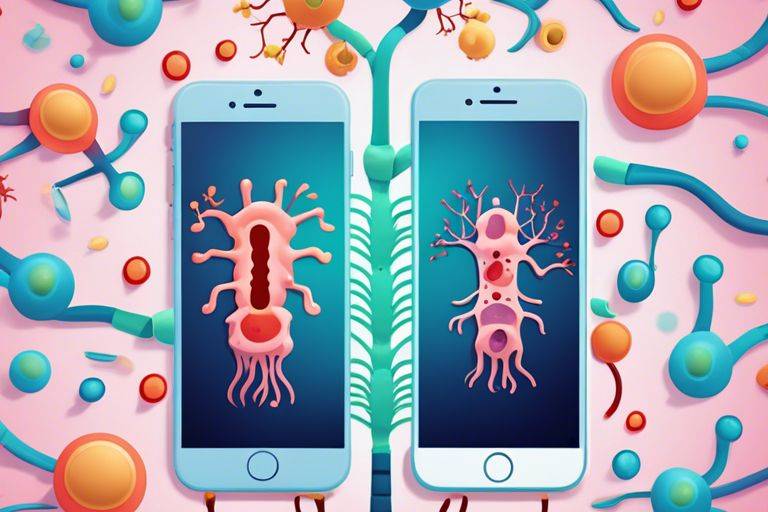
Many of us are unaware of the incredible impact that the bacteria in our gut can have on our mood. Recent research has shown that the delicate balance of good and bad bacteria in our digestive system can directly affect our mental health. Understanding this connection is crucial, as it can help us make informed decisions about our diet and lifestyle to support not only our physical but also our emotional well-being. Let’s research into the fascinating world of gut bacteria and discover how it influences our mood.
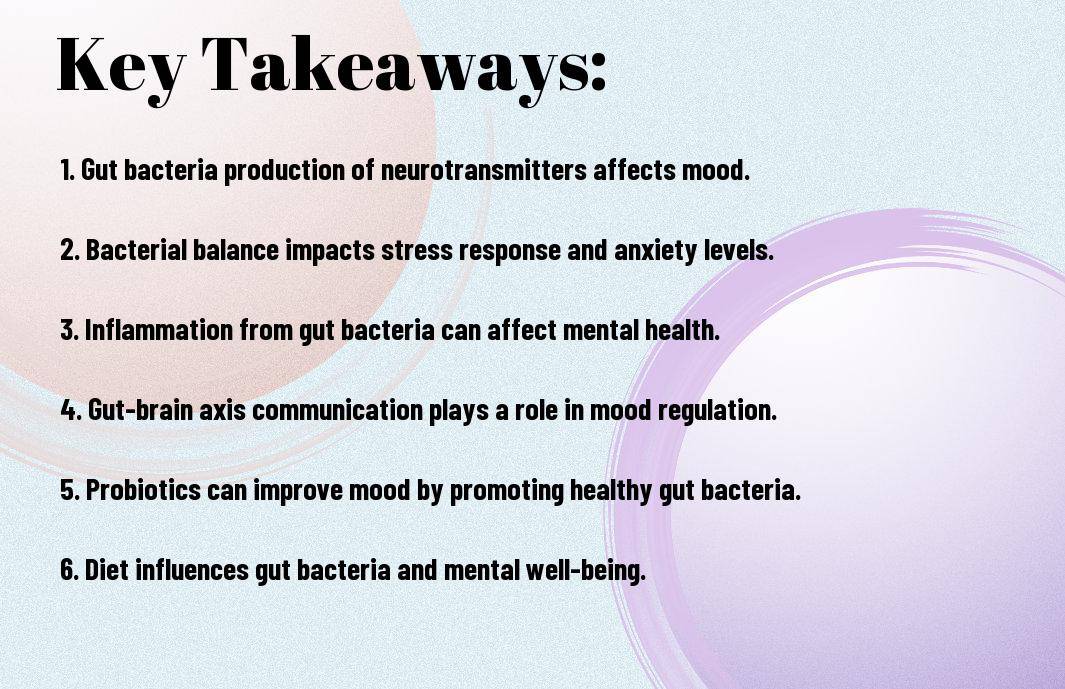
Before entering into the fascinating world of how bacteria in your gut can influence your mood, I want to highlight an crucial link between your microbiome and mental health. If you want to explore more on this connection, check out The Surprising Link Between Your Microbiome And Mental Health.
One key player in the gut-brain connection is the vagus nerve, a long cranial nerve that runs from the brainstem to the abdomen, often referred to as the “wandering nerve.” This nerve acts as a direct communication channel between the gut and the brain, allowing for bidirectional signaling between the two.
Communication between the gut and the brain is further facilitated by the microbiome’s role in neurotransmission. Gut bacteria produce various neurotransmitters, including serotonin and dopamine, which are crucial for regulating mood and behavior. This interaction influences your mental health in profound ways.
Understanding the microbiome’s role in neurotransmission sheds light on how imbalances in gut bacteria can impact your mental well-being. **Strong** Research suggests that disruptions in this gut-brain communication can contribute to conditions like anxiety, depression, and even neurodegenerative disorders. On the **positive** side, maintaining a healthy gut microbiome through diet and lifestyle choices can support optimal mental health and emotional balance.
Some researchers believe that gut bacteria play a crucial role in the production of neurotransmitters, such as serotonin and dopamine, which are key players in regulating mood and emotions. Imbalances in these neurotransmitters can lead to mood disorders like depression and anxiety.
With gut bacteria influencing the immune system, they also have a hand in regulating inflammation throughout the body. Chronic inflammation is linked to a higher risk of developing mood disorders and cognitive decline.
Another way gut bacteria impact mood is by modulating the body’s stress response. Imbalances in stress hormones can lead to increased anxiety and a decreased ability to cope with stressful situations.
Inflammation caused by imbalances in gut bacteria can directly impact the body’s stress response system. This can lead to a vicious cycle, where stress worsens inflammation, which in turn affects mood and mental health.
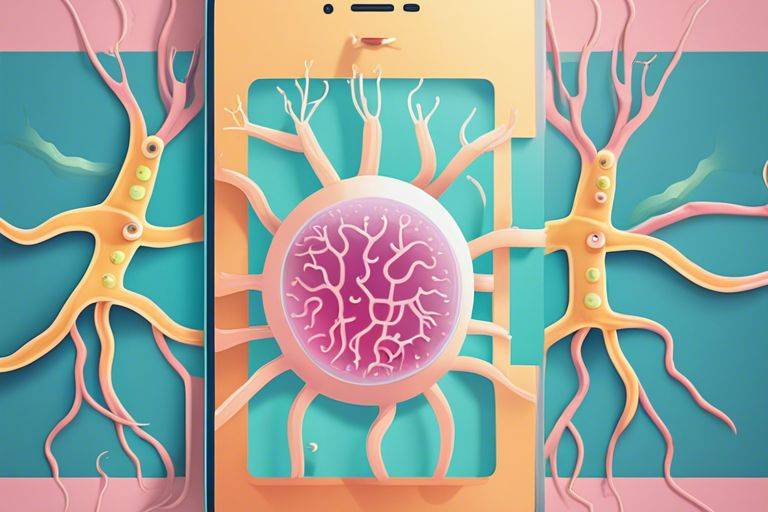
Science has shown that the Gut-Associated Lymphoid Tissue (GALT) plays a crucial role in the communication between the gut and the brain. It is a part of the immune system located in the gut and can influence mood and behavior.
Systematically, the Enteric Nervous System (ENS) is responsible for the bidirectional communication between the gut and the brain. It is often referred to as the “second brain” and contains millions of neurons that can operate independently of the central nervous system.
GutBrain The Enteric Nervous System (ENS) is a complex network of neurons that can sense the environment within the gastrointestinal tract, modulate gut motility, and regulate the secretion of enzymes and hormones. It plays a vital role in gastrointestinal functions and can also influence emotions and mood.
GutBrain Short-chain fatty acids (SCFAs) are produced by gut bacteria during the fermentation of dietary fiber. These SCFAs, particularly butyrate, acetate, and propionate, have been linked to various health benefits, including improved mood and cognitive function.
For instance, butyrate has been shown to reduce inflammation in the gut and promote the growth of beneficial gut bacteria. It can also cross the blood-brain barrier and exert neuroprotective effects, potentially influencing mood and behavior positively. Including fiber-rich foods in your diet can promote the production of SCFAs and support a healthy gut-brain axis.
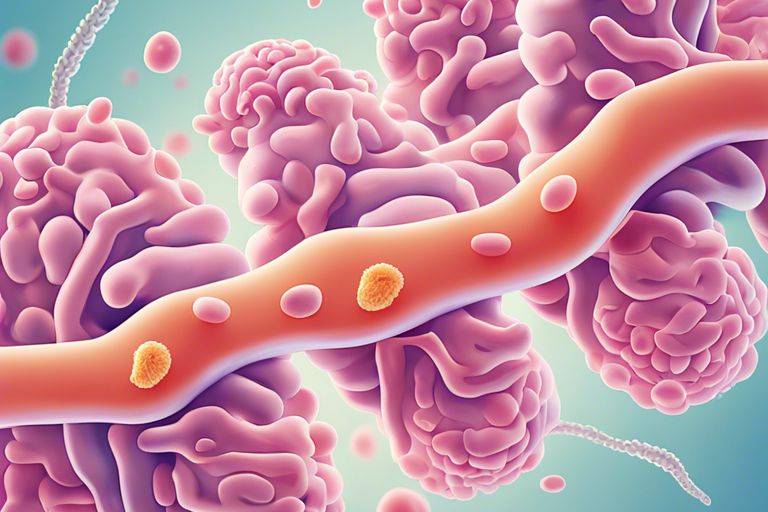
To understand how diet can impact the bacteria in your gut, let’s start with fiber-rich foods. Bacteria thrive on fiber, particularly the good kind found in fruits, vegetables, and whole grains. When you consume a diet rich in fiber, you’re providing a feast for these beneficial bacteria, allowing them to flourish and support your overall gut health.
With a high-sugar diet, the story takes a darker turn. When you consume excess sugar, it can lead to an imbalance in gut bacteria, particularly favoring harmful bacteria that thrive on sugar. This imbalance can contribute to inflammation in the gut, weaken the intestinal barrier, and even impact your mood through the gut-brain axis.
The consequences of consuming too much sugar go beyond just potential weight gain and tooth decay. A diet high in sugar can disrupt the delicate balance of bacteria in your gut, which can have far-reaching effects on your overall health.
Bacteria play a crucial role in maintaining a healthy gut, and probiotics and prebiotics can be valuable allies in this quest. Probiotics are beneficial bacteria found in certain foods like yogurt and sauerkraut, while prebiotics are a type of fiber that nourishes these good bacteria. Together, they can help restore equilibrium in your gut microbiome and promote better digestion and overall well-being.
A diet rich in probiotics and prebiotics can have a positive impact on your gut health, fostering a diverse community of beneficial bacteria that support not only your digestion but also your mental health.
Now, let’s explore into the fascinating link between your gut and your brain when it comes to anxiety and depression. Studies suggest that the gut microbiota can communicate with the brain through various pathways, influencing mood and behavior.
Anxiety and depression are not the only mental health conditions affected by the gut. **Recent research has shown that imbalances in gut bacteria may also play a role in disorders like schizophrenia and bipolar disorder,** demonstrating the far-reaching impact of gut health on mental well-being.
With recent advancements in microbiome research, scientists are uncovering the intricate connections between the gut and the brain. **Studies have found that certain strains of gut bacteria can produce neurotransmitters like serotonin, which play a key role in regulating mood and emotions.** These findings suggest that maintaining a healthy balance of gut bacteria could be crucial for managing psychiatric disorders.
Depression and anxiety can be debilitating, but emerging evidence offers hope for new treatment avenues focused on gut health. **Researchers are exploring the potential of probiotics, prebiotics, and even fecal transplants to restore gut balance and improve mental well-being.** These gut-focused therapies could revolutionize the field of mental health treatment, offering more holistic and personalized approaches.
**Gut-brain communication is a complex and dynamic process with profound implications for mental health.** By understanding and harnessing the power of the gut microbiome, we may unlock new possibilities for managing and treating a range of psychiatric disorders, paving the way for a brighter and healthier future.
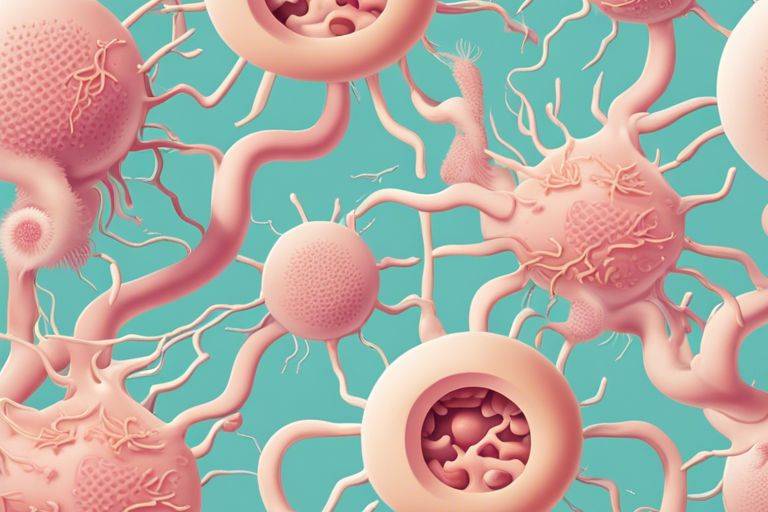
One exciting area of study in gut-brain research involves investigating the role of specific bacterial strains in influencing mood and behavior. Researchers are exploring how these bacteria communicate with the brain and how they might be manipulated to improve mental health.
For instance, the potential applications of gut-brain research in medicine and psychology are vast. Understanding how gut bacteria can impact conditions like anxiety, depression, and even neurodegenerative diseases could lead to groundbreaking treatments that target the microbiome.
Medicine, microbiology, neuroscience, and psychology must come together for a comprehensive understanding of the gut-brain connection. Collaboration between these fields is crucial for developing effective interventions that leverage the power of the gut microbiome on mental health.
Research in this area is still in its early stages, but the potential benefits are immense. By working together, scientists and healthcare professionals can revolutionize mental health treatments, offering new hope for those struggling with mood disorders and other psychological conditions.
Hence, the intricate relationship between the bacteria in your gut and your mood is a fascinating example of the complexity of the human body. By understanding how these tiny microorganisms can influence our emotions and mental health, we can begin to appreciate the importance of maintaining a healthy gut microbiome. So, the next time you’re feeling down, remember to nourish your gut with foods that support a diverse and balanced microbial community for a happier mind and body.
A: Bacteria in the gut can produce neurotransmitters like serotonin and dopamine, which play a key role in regulating mood.
A: The gut-brain axis is a bidirectional communication system between the gut and the brain, involving neural, endocrine, and immune pathways.
A: Yes, disruptions in the balance of gut bacteria, known as dysbiosis, have been linked to conditions like anxiety, depression, and even autism.
A: Diet plays a crucial role in shaping the composition of gut bacteria, so a diet rich in fiber and healthy foods can promote a diverse and beneficial gut microbiome, which in turn can positively impact mood.
A: Symptoms like chronic stress, mood swings, digestive issues, and fatigue can be indicators that your gut bacteria may be influencing your mood.
A: Eating a balanced diet rich in fiber, fermented foods, and prebiotics, reducing stress levels, getting regular exercise, and taking probiotic supplements can all help improve gut health and mood.
A: Certain strains of probiotics, such as Lactobacillus and Bifidobacterium species, have been shown to have positive effects on mood and may help alleviate symptoms of depression and anxiety.